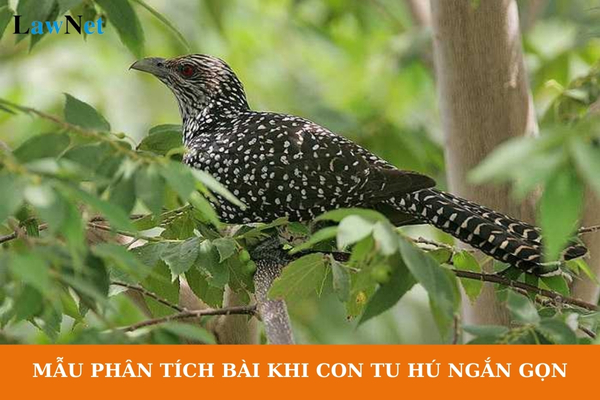What is the sample analysis of the poem "Khi con tu hú"? What is the organizational structure of the Textbook Selection Council at the lower secondary schools in Vietnam?
What is the sample analysis of the poem "Khi con tu hú"?
The poem "Khi con tu hú" by the author To Huu is part of the 8th-grade Literature curriculum. Students can refer to the concise analysis of the poem "Khi con tu hú" below:
Brief analysis of the poem "Khi con tu hú":
|
To Huu was a great poet of the nation, someone who was always closely attached to the revolution and the life of the people. The poem “Khi con tu hú” is one of his representative works, composed in 1939 when he was only 19 years old and detained in Tu Phu prison (Hue). The poem clearly portrays the vibrant summer nature scene and the restless longing of a prisoner craving freedom.
“I hear summer roaring in my heart, The summer call resonates in the heart like an urging voice. The phrase "kick apart" expresses the resentment, wanting to break the confinement. The narrow, suffocating prison space seems to strangle the soul of the soldier. The cuckoo’s call outside only makes the pain more agonizing, as if mocking the desire for freedom. |
Detailed analysis of the poem "Khi con tu hú":
|
1. General Introduction about the Author and the Work “When the cuckoo calls its flock, - The cuckoo’s sound suggests a summer setting with the image of golden ripe rice fields and sweet fruits. This sound signals a vibrant, lively summer approaching. The scene continues to open up with images: “The garden resonates with cicada cries, - The cicada hums calling for summer, the image of golden ripening corn, all exude beauty filled with vitality and light. There is the bustling nature, life thriving. That beautiful summer invites humans to integrate, enjoy. Especially, the image: “The sky grows wider and higher, - The summer sky is clear, blue, and endless. The kites flying freely in the sky symbolize the desire for freedom, soaring joy, unrestrained. These lines depict a lively, radiant summer picture rich in sound and color. “I hear summer roaring in my heart, - The call of summer stirs in the author a fierce longing. The phrase "kick apart" reflects the exasperation, wanting to break free from the suffocating prison space. It’s the voice of a freedom-loving person confined within four narrow walls.
|
Note: The content is for reference only
What is the organizational structure of the Textbook Selection Council at the lower secondary schools in Vietnam?
Under point b, Clause 2, Article 4 of Decree 27/2023/TT-BGDDT on the Textbook Selection Council :
Textbook Selection Council
...
2. Quantity and Composition of Council Members
a) The Council includes: the head, deputy head; heads of specialized teams, specialized groups, specialized departments (collectively referred to as specialized teams), representatives of teachers, and representatives of the Parents’ Committee of the educational institution. The number of Council members is an odd number, with a minimum of 11 (eleven) members. For educational institutions with fewer than 10 (ten) classes, the minimum number of Council members is 05 (five);
b) The Council structure includes: Chairman, Vice Chairman, Secretary, and Council members. The Council Chairman is the head; in cases where the head cannot participate in the Council as regulated in Clause 3, Article 4 of this Circular and in unavoidable circumstances, the Council Chairman is the deputy head. The Council Vice Chairman is the deputy head or the head of the specialized team. The Council Secretary is selected from among the Council members.
...
Thus, the Textbook Selection Council at the lower secondary schools in Vietnam includes: Chairman, Vice Chairman, Secretary, and Council members. The Chairman of the Council is the head.

What is the sample analysis of the poem "Khi con tu hú"? What is the organizational structure of the Textbook Selection Council at the lower secondary schools in Vietnam? (Image from the Internet)
What are the working principles of the Textbook Selection Council at the lower secondary schools in Vietnam?
According to Article 5 of Decree 27/2023/TT-BGDDT, the working principles of the Textbook Selection Council at the lower secondary schools in Vietnam are:
- The Council operates on the principles of concentration, democracy, objectivity, transparency, openness, and in accordance with the law.
- A Council meeting is deemed valid when at least 3/4 (three-fourths) of the members participate, including the Chairman, Vice Chairman, and the Council Secretary.
- The results of each Council meeting are recorded in minutes, including all opinions of the members and made public at the Council. The minutes must be signed by the Chairman and the Council Secretary.

